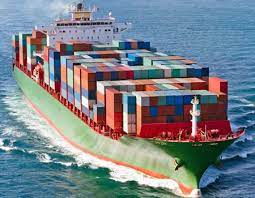Freight forwarders have expressed concerns over the surge in the cost of import, especially freight rates from China. This is even as they have blamed the increase on the high presence of empty containers in the ports, terminals and holding bays in Nigeria.

Shipping Position Daily recalls that the Nigeria Port Authority (NPA) had earlier given a directive that all shipping companies should return at least 70 percent of import containers onboard their ships. It also empowered port managers to sanction shipping companies that are unwilling to return the empty containers, as well as stop the collection of illegal money for depositing empty containers at their holding bays.
The Managing Director of Mediterranean Shipping Company (MSC) Nigeria and Acting Chairman for the Shipping Association of Nigeria (SAN), Andrew Lynch had earlier told Shipping Position Daily that efforts are being made by shipping companies to ensure that 100 percent of empty containers are evacuated from the holding bays, even as he stated that the shipping lines had achieved an evaluation of 98 percent as at last year.
In his words: “The 80 percent return of empties as directed by the Nigerian Port Authority has been met, maybe not on every vessel. My shipping company together with Maersk Line which is the second largest as of last year repatriated 98 percent of everything that came in. And this year we have recorded 93 percent. I give these figures to NPA regularly; 93 percent is not enough and we’re working towards 100 percent. There is a shortage of containers worldwide especially in the major exporting countries like China and India and we need those empty containers there and not at the holding bays”, he stated.
But, speaking exclusively with one of our correspondents last week, Mr. Francis Omotosho, freight forwarder and Registrar of National Association of Government Approved Freight Forwarders (NAGAFF) Academy, noted that the high cost of import freight from China is traceable to the high demand of containers needed in China with containers littered in the Nigerian space. He however called on the Government to look into the issue by ensuring local shipping agents’ compliance with the container return order.
“The surge is already a big problem. The supply chain has a beginning and an end. Once you refuse to return a container to the source after it has been offloaded, it becomes a problem. In China, each container has a life span. The container business sector is also having serious challenges. They are looking for their containers and they cannot get them. They cannot go back to construct another container without knowing what is wrong with their boxes around the world. They are not getting feedback. Even their local agents in Nigeria and other parts of Africa are not giving them the real information why the empty containers are yet to be returned. Since they don’t have these containers and there is a high demand, certainly there will be a hike in the price of renting out the container, because the cost of going into the yard to build another container is very critical compared to what is going on in the world today in the likes of the COVID 19 and Omicron. It is affecting everybody and the supply chain system.
He accused shipping lines operating in Nigeria of not doing enough to get the containers back to their home countries. “The shipping lines’ local representatives in Nigeria are not doing anything. They are just killing the business and the supply chain partners. The government needs to look at those local shipping agents representing international carrier vessels to know what to do about them, because they are not helping matters. They think they don’t have anything at stake. China has a shortage of empty containers, out of which a chunk of them are being held down in the holding bays in Nigeria” Omotosho said.
Also Speaking, the National Financial Secretary of the Association of Nigerian Licensed Customs Agents (ANLCA) Hajia Bola Muse noted that the proposed additional charge of $1,000 on all imported freight from China is yet to be implemented. She said discussions are still ongoing by appropriate authorities as to how it can be looked into.
She said: “The hike has not taken effect yet. We are still waiting, but I think the appropriate authorities are discussing it. The proposed rate is going to affect us seriously especially in the importation of goods and the end-users. The appropriate authorities should make sure that they look into it seriously.
“It is only in Nigeria that a vessel will come in with the import and go back empty. What are the benefits of these empty containers to us? We buy consignments; rent the container, pay the same amount you pay over there and now we are still paying more than 100 percent of that container. Of what purpose are these containers to us in Nigeria, if not that they have turned Nigeria into a dumping ground. They can’t try what they are doing here in other countries”, Muse lamented.
On the contrary, a former Vice Chairman of the Council for the Regulation of Freight Forwarding in Nigeria (CRFFN), Chief Henry Njoku disagreed stating that the high rate of freight is due to the congestion of the Lagos port. He however called on the shipping companies to take on their responsibilities by providing holding bays for empty containers and make adequate plans to return them.
Read Also: CRFFN Lacks Technical Know-how To License Agents – Freight Forwarders
In his words: “I don’t think the hike in freight has anything to do with empty containers. It is just the fact that our ports are congested and some of them are idle. If others like Warri and the others are operational, the ports won’t be congested.
On his part, a freight forwarder, Pius Ujubonu stated that freight from China to Nigeria has been on increase for the past one and half years, even as he noted that it is the responsibility of the Nigerian Shippers’ Council and Nigerian Port Authority (NPA) to address the situation.
“Why you won’t blame anybody for an increase in Nigeria, is because our maritime environment, especially the upstream is not very structured. The empty containers only impact the cost of the freight itself. The freight from China to Nigeria has been on increase for the past one and half years. Nigeria is the highest, Ghana, Togo, and Cotonou are cheaper. The problem of economic regulation becomes a question mark. What is the role of the Nigerian Shippers’ Council and the Nigerian Port Authority? How can they help to ameliorate the situation? These are the confusion we are having” he concluded.
Kindly like us on Facebook
















Discussion about this post